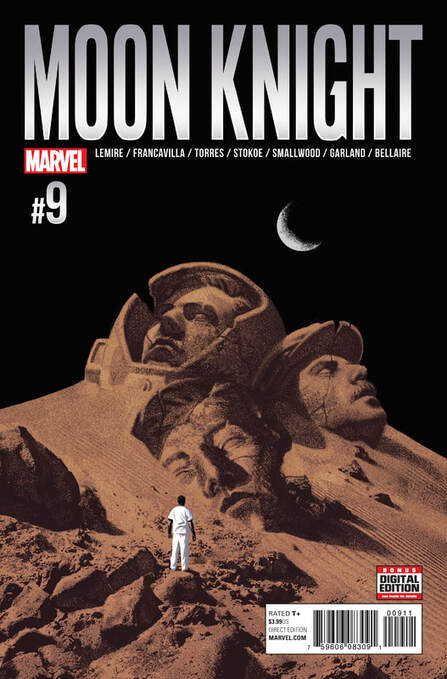Written by Joel T. Lewis There is a tried and true way to determine whether or not I’ve been moved by something I've read. You'll see me finish a sentence, look away from the page, and put whatever I'm reading down for a minute. Everything I've ever read that's had an impact on me has made me do this. At the end of a line I'm so blown away that I have to let the moment sit in my mind. I have to breathe it in before I continue. I've sung the praises of Jeff Lemire’s Moon Knight for 8 articles straight and it’s because every single issue has made me do this. But then with the 9th issue, Lemire gave Moon Knight fans, gave me, something so breathtakingly beautiful that I have been nearly moved to tears with each re-reading. This is perhaps the comic book that means the most to me and here’s why. In the 200+ issues that bear his name and the countless appearances he’s made as an Avenger, Defender, Hero for Hire, and Marvel Knight, Moon Knight has never treated his psyche gently. He’s always been a splintered figure, as much in conflict with himself as with the Bushman or Black Spectre. Throughout his publication we’ve seen Marc Spector batter, abuse, suppress, and conceal his multiple identities in order to present himself as a sane man. In the beginning he used his fractured psyche to divide himself between the violence of the street, the comfort and intimacy of his home, and the twisted darkness of his past. Despite his best efforts, Moon Knight was never able to keep his personalities separate. This fact has always been met with conflict and censure. When the darkness of Marc Spector’s past creeps in and affects Marlene’s relationship with Steven Grant, Grant attempts to stamp out that persona, denying his past. When working with the West Coast Avengers, Moon Knight doesn’t reveal his confusion of personality with his teammates out of fear of expulsion. Even in the throes of Civil War, Iron Man decides against arresting Moon Knight for fear of worsening his mental health and Captain America refuses to recruit him because of his unpredictability. With each new chapter in the Moon Knight saga writers have reshuffled and highlighted each of his personalities but they have always been portrayed as blunt tools to accomplish certain goals or inconvenient barriers that negatively affect Moon Knight’s ability to connect to those closest to him. True to form, Jeff Lemire’s 9th issue pays a heartfelt tribute to the history of Moon Knight, while blazing a bold new trail with how he handles the character’s splintered psyche. Marc Spector tells Jake Lockley, Captain Spector, and Steven Grant that while they are all aspects of his mind, they don’t really exist. Understandably, they don’t take this news too well and interrogate Spector, probing for some hidden agenda. Marc explains that he has to deal with each of them in order to move forward. Grant asks how the sand-covered landscape of his Marvel Studios movie has come to life and Spector tells him there is no movie, calling him by his name. Grant asks, 'You know me?' Spector replies, 'Of course I do. I’ve known you the longest Steven.' He goes on to identify Jack Lockley as another of his old aliases. As Marc points to Captain Spector, acknowledging how new and bizarre this persona seems to him, we are treated to the last panels of James Stokoe. Captain Spector cries out for help as he dissolves into sand carried away by the wind. Next, we shift to the art style of Francesco Francavilla as Jake Lockley (Dressed as Moon Knight) attacks Marc, accusing him of murdering the Captain. 'What did you do to him?' Lockley shouts as he slugs Marc across the face. Marc responds with the not-so-sinister truth, 'Just confronting him did it. He was weak. Not fully formed, just a sketch, really.' Lockley reaches for the truncheon strapped to his leg, hell-bent on duking it out with Marc. Marc begs him to reconsider, 'I don’t want to fight you. Fighting you is what I’ve always done. And it led us here. I want to try a new way...a better way. I want to acknowledge you. Accept you. And then move on.' Lockley ignores this earnest request and presses the attack. Marc reluctantly fights back, accepting that since violence is all that Lockley understands, it is with violence that he must be dealt with. Pulling a crescent dart from inside his suit coat, Marc apologizes to Lockley, 'I’m sorry it had to go this way...Yes I’ll always need you...a part of you anyway.' Lockley falls and disappears in a cloud of sand. Marc turns to face Steven only to discover that he’s run away. Calling his name, Marc follows his footsteps in the sand down the abandoned streets of New Egypt and catches up with him in an empty office building. Grant has stopped running and can’t understand how he isn’t real. He remembers so much of his past: Coney Island, and seeing movies, and falling in love. How can that not be real? Marc kneels down to comfort Steven:  'Because it was real. You’ve always been with me. We shared our lives together. You were the first. You came to me when I was very young. At first I thought you were an imaginary friend that I would play with when I was alone at home. Then we weren’t playing together. I was you. Then I’d be me again for a while.' Marc confides in Steven about the horror of waking up in a mental hospital and having his deepest fear realized: he was losing himself to madness. Through these panels brought to life by Wilfredo Torres, Jeff Lemire gives Marc something no other comic writer has, self-acceptance. Marc tells Steven: 'I--I’ve been sick my whole life. And I’ve felt ashamed of that. I tried to hide it. I think that’s what the mask really was. Another way to hide. But I don’t want to hide anymore. I don’t want to be ashamed anymore. I just want to be me. I know I will never be cured. But I need to at least find a better way to live with this.' Marc asks Steven if he will help him. Help him restore his identity and find himself again. Steven agrees with one condition, 'Promise me you’ll find a way to be happy.' As the two men embrace Grant disappears and Marc is left alone. In almost deafening silence Marc Spector feels the most clear-headed he’s been in 9 straight issues. And he has a plan. 1. Go back to the hospital and 2. Kill Khonshu. Now I know this is an especially long recap but I just have to make a few more points before I put this issue away for a while. First I want to address Marc Spector’s description of the Captain Spector/Werewolves on the moon storyline as just a sketch. Marc Spector the Starfighter and his quest to defend the human refugees on the moon from an invasion of space werewolves is one of the most ambitious re-imaginings of Moon Knight ever. Jeff Lemire could have written a 10 issue series of that storyline by itself and I would’ve bought every issue. But he didn’t. He introduced that storyline and that persona to make a point about how integral Jake Lockley and Steven Grant have been to the history of Moon Knight and he allows that storyline and character design to fade away for the sake of the larger narrative. Ambition, innovation, and respect for the history of the character. I cannot say it enough, Jeff Lemire was born to write Moon Knight Comics. Next I want to talk about what Lemire does with Marc Spector and Steven Grant’s relationship. Never before in a Moon Knight comic has Steven Grant existed before Marc Spector’s death in Egypt. By extending their history back to Marc’s childhood, Lemire contributes a humanity and an innocence to Spector’s identity disorder. Marc’s splintered psyche is not the result of a near-death experience at the feet of a Moon God statue or an actual death and resurrection at the hands of an Othervoid god. He was born with his mental condition. He mistook a fragment of his mind for an imaginary friend and shared his whole life with him. Suddenly Marc’s mental health problems aren’t some cruel cosmic violation, some unnatural joke that he’s been plagued with because of a vengeful god. Spector is human and his is the kind of pain that people cope with in real life. This has huge implications for the history of these two identities and I’m looking forward to going back and rereading some of the formative issues of Moon Knight with this continuity in mind. Finally, I’d like to discuss Marc’s acceptance of his mental condition. I can’t quite explain how beautiful it is for a character to be as vulnerable, honest, and optimistic as Marc Spector is about his mental health. He acknowledges his fear and his shame. He accepts that his condition isn’t going away, but that doesn’t stop him from wanting to live a healthier life. Jeff Lemire has given Moon Knight and his readers an incredible gift with issue 9 and all I can say is thank you. Until next time, Geek On!
0 Comments
Leave a Reply. |
Archives
May 2024
|
|
© 2012-2025, Nerds That Geek LLC.
All Rights Reserved. |
uWeb Hosting by FatCow
